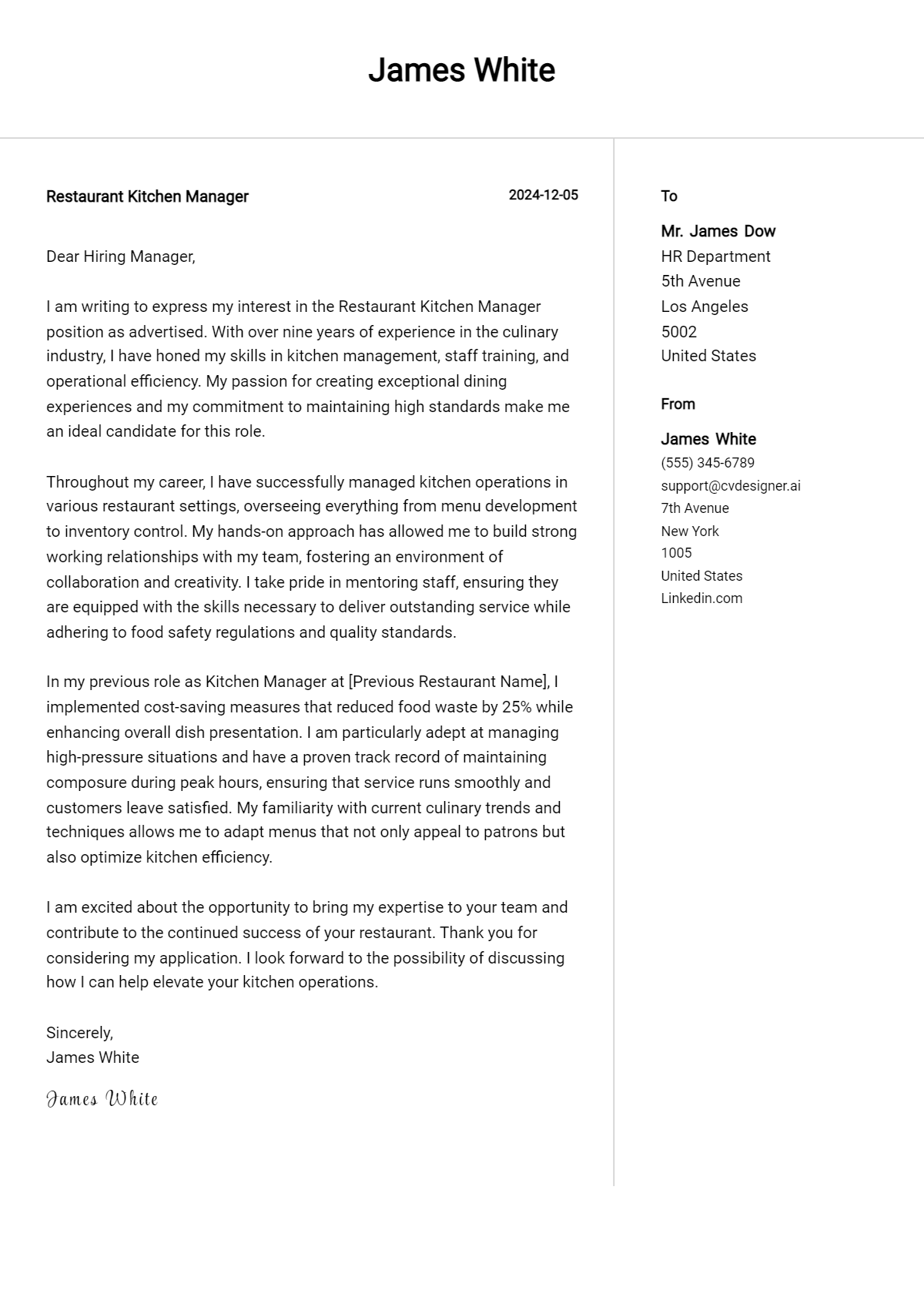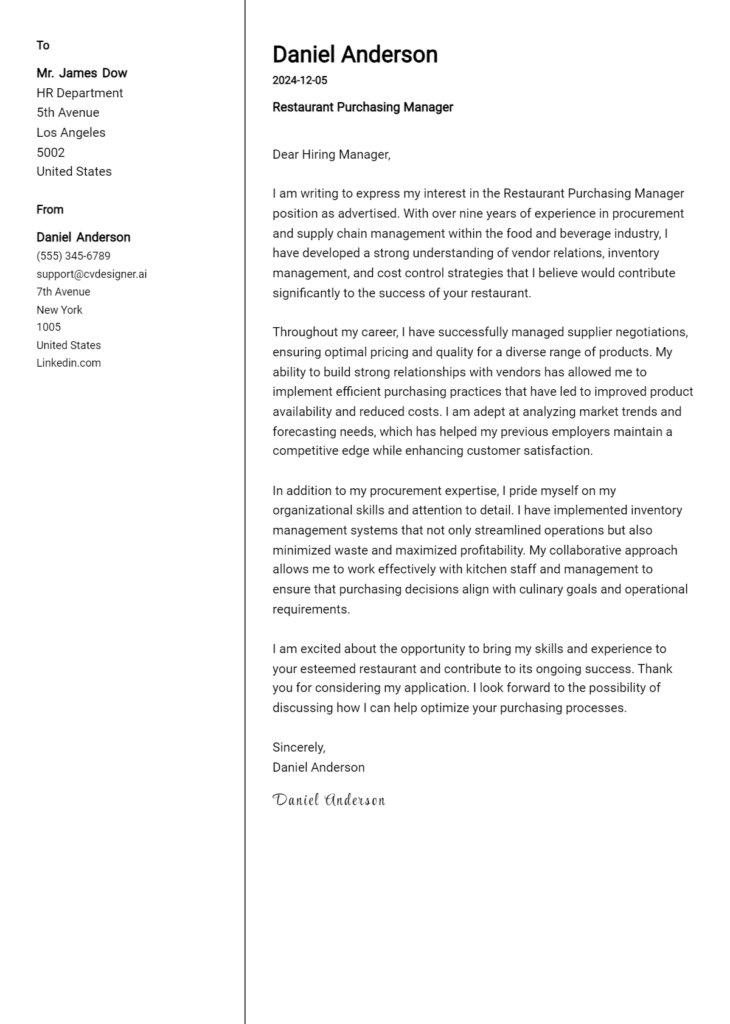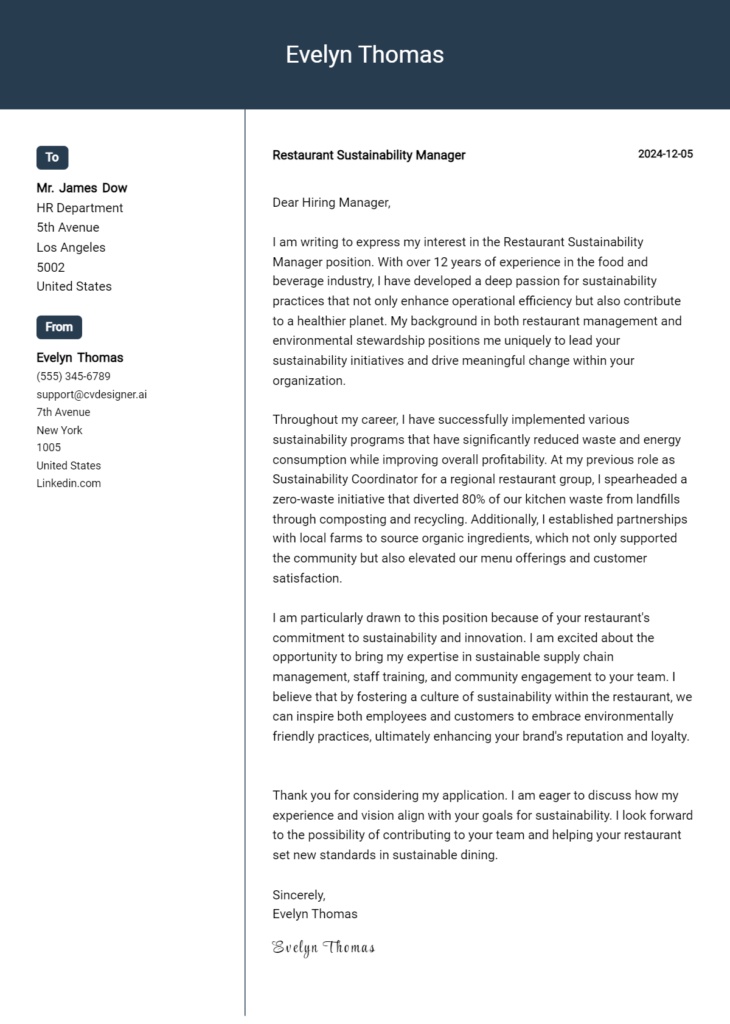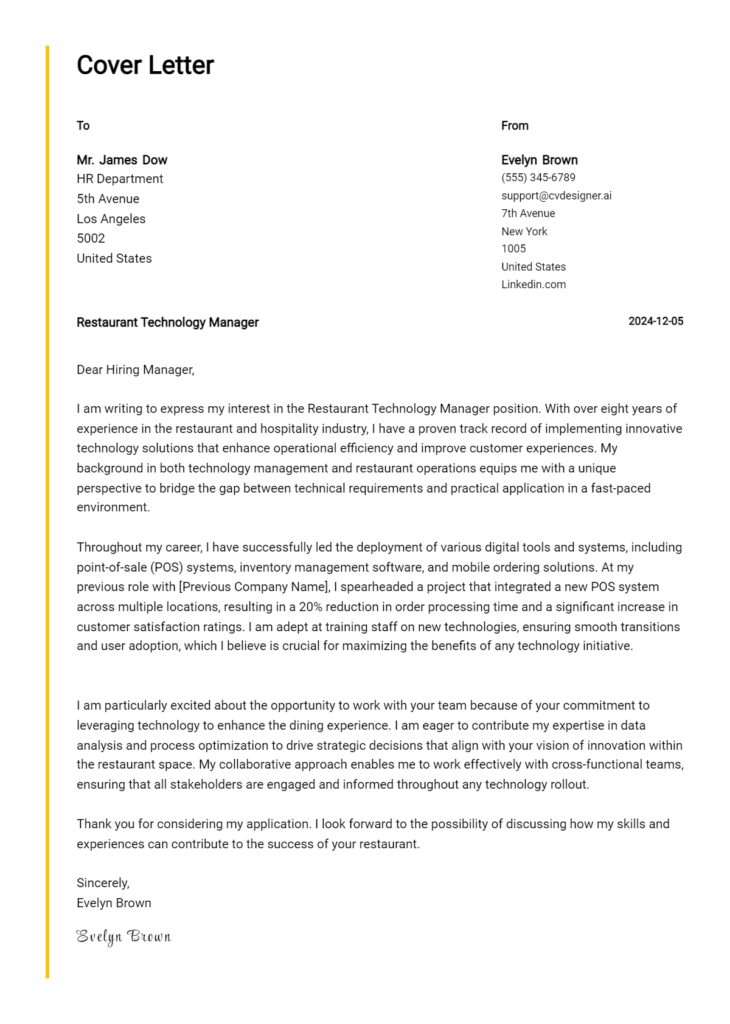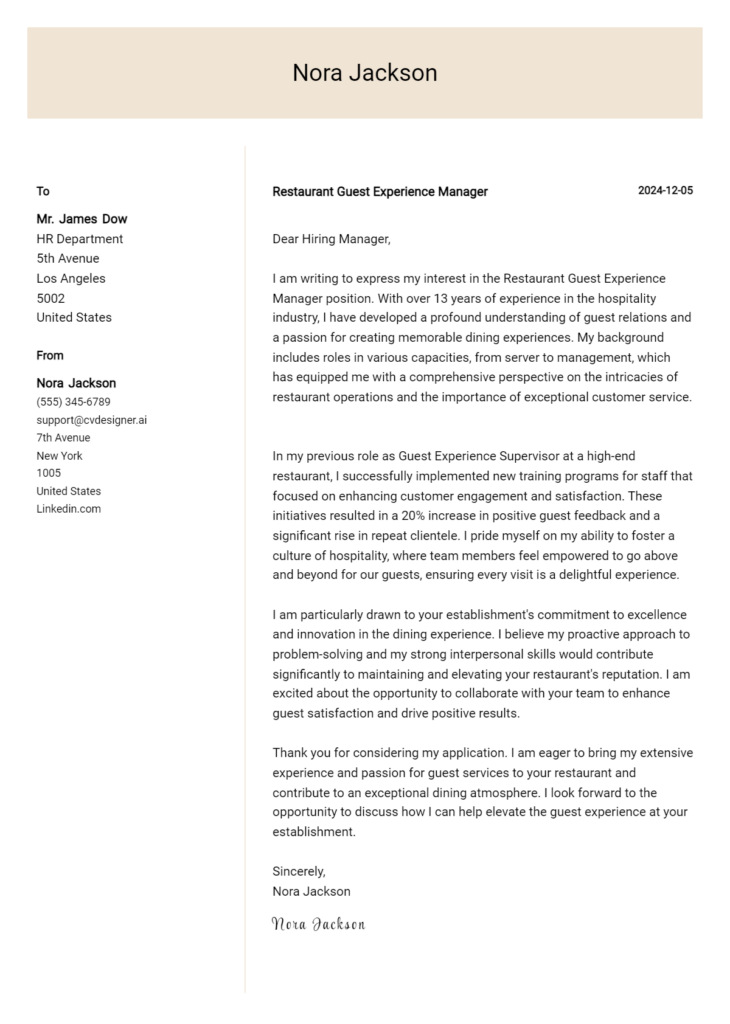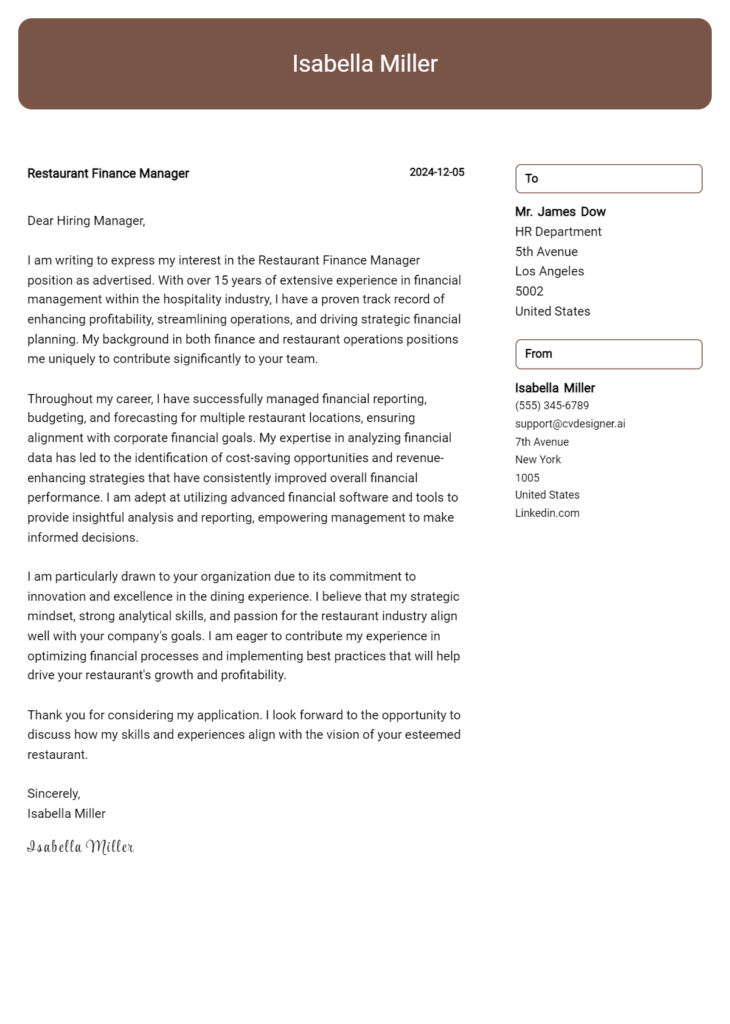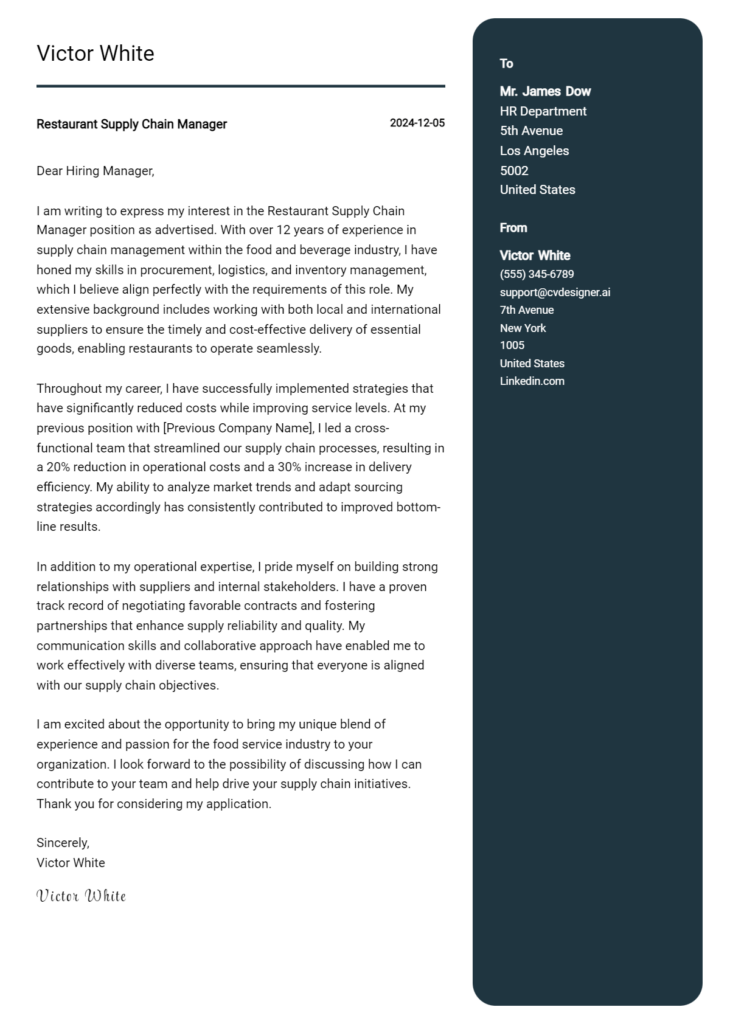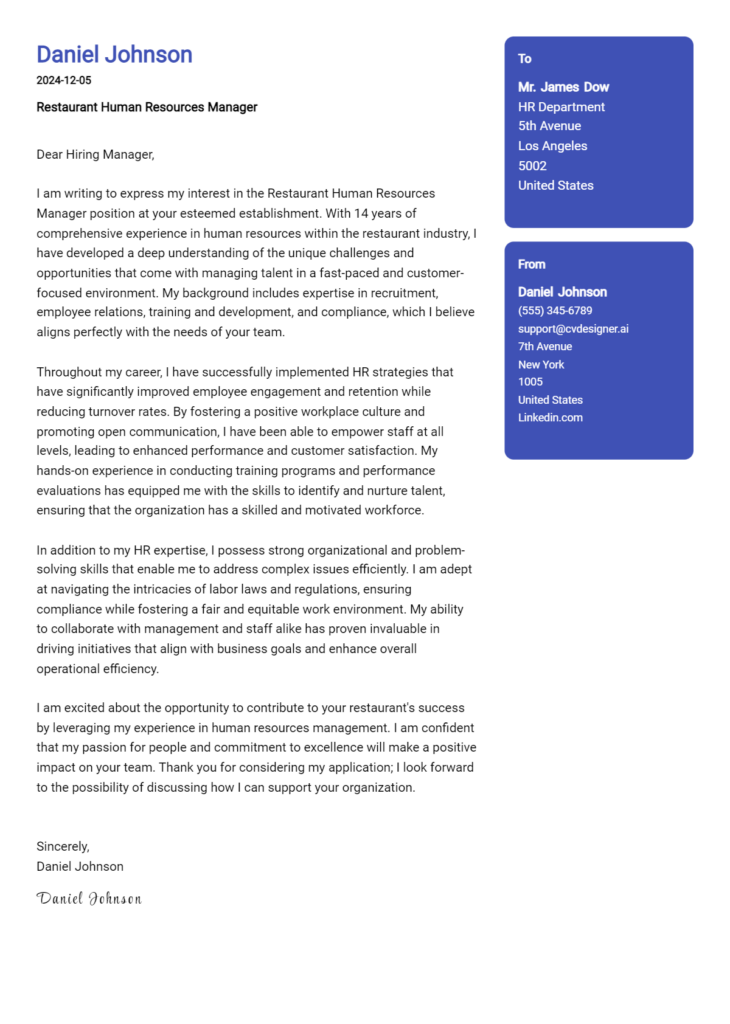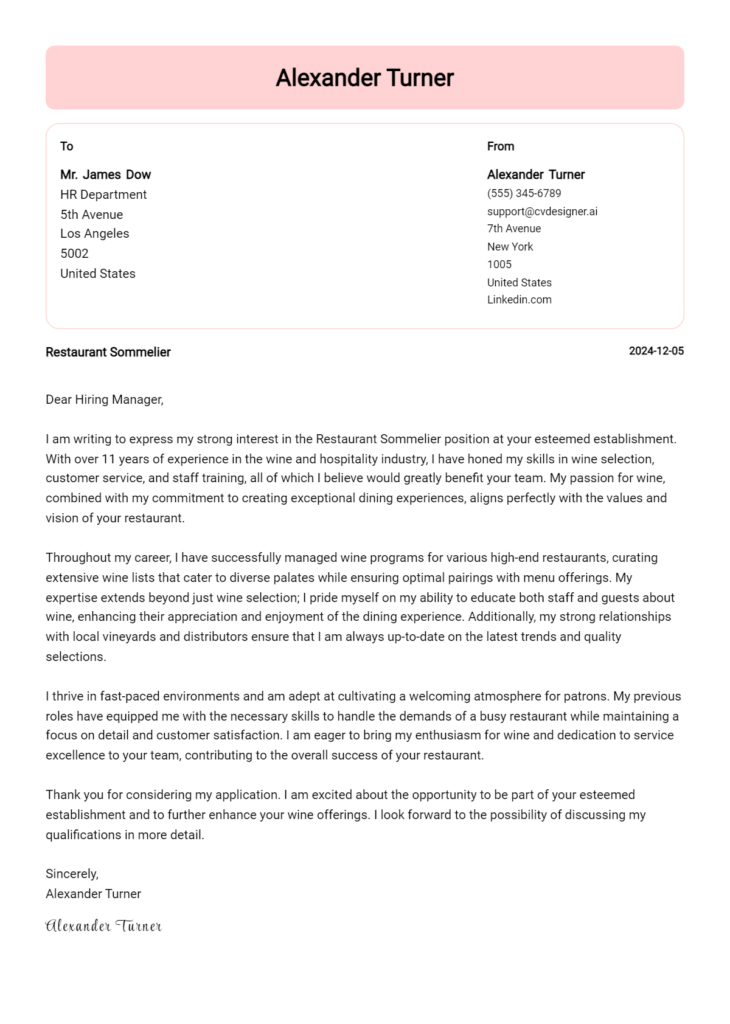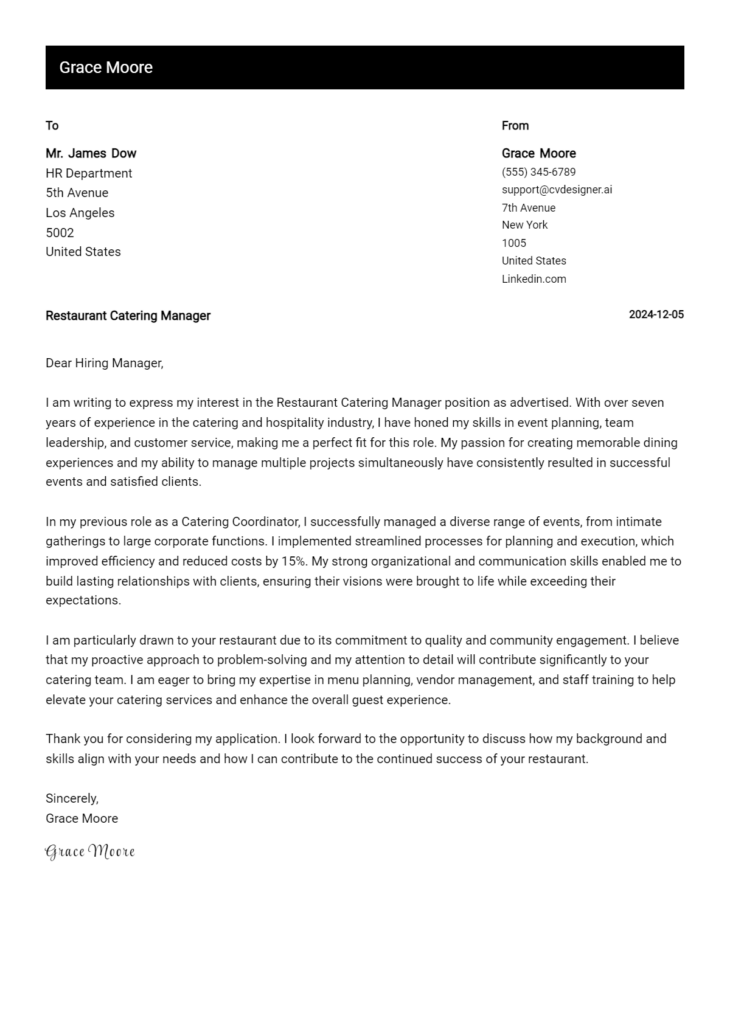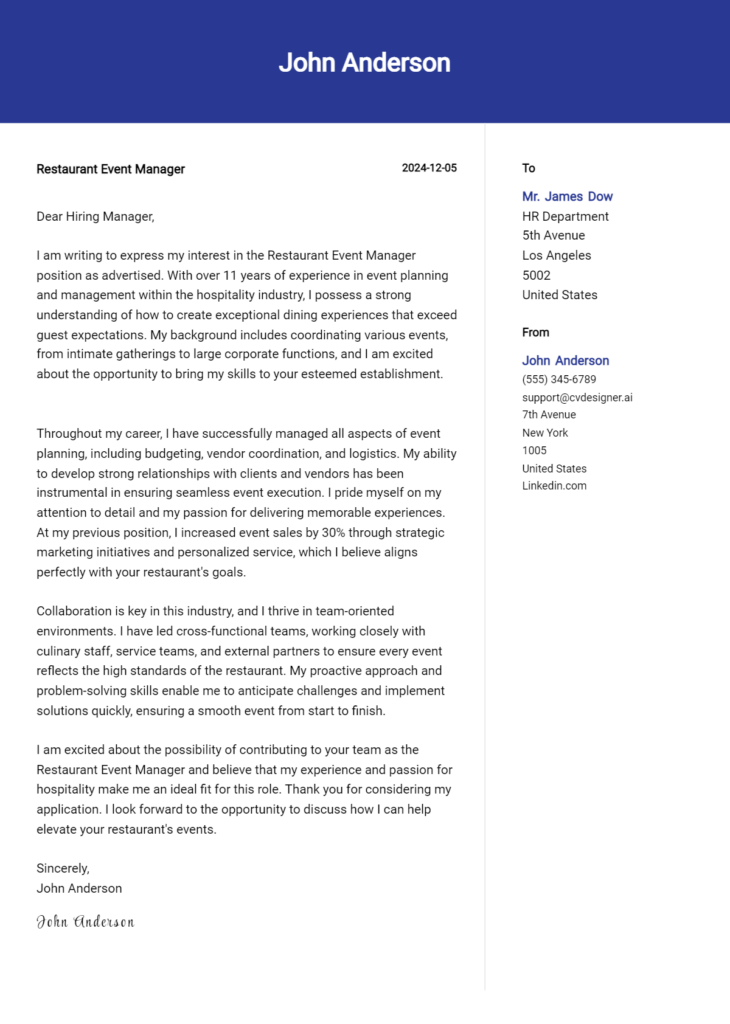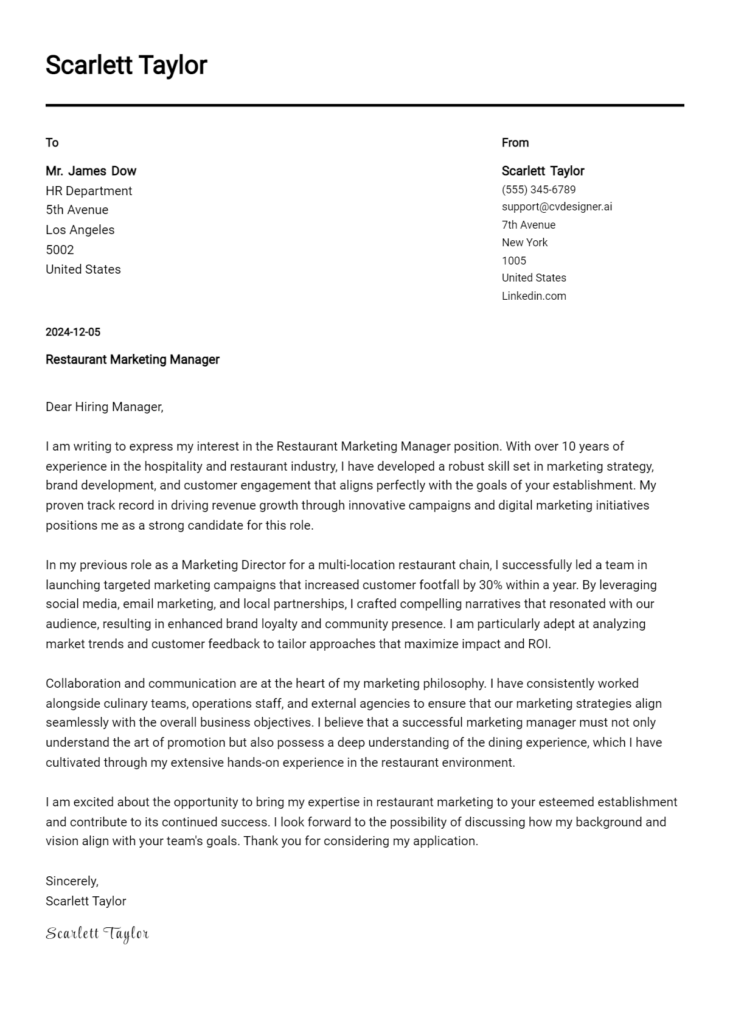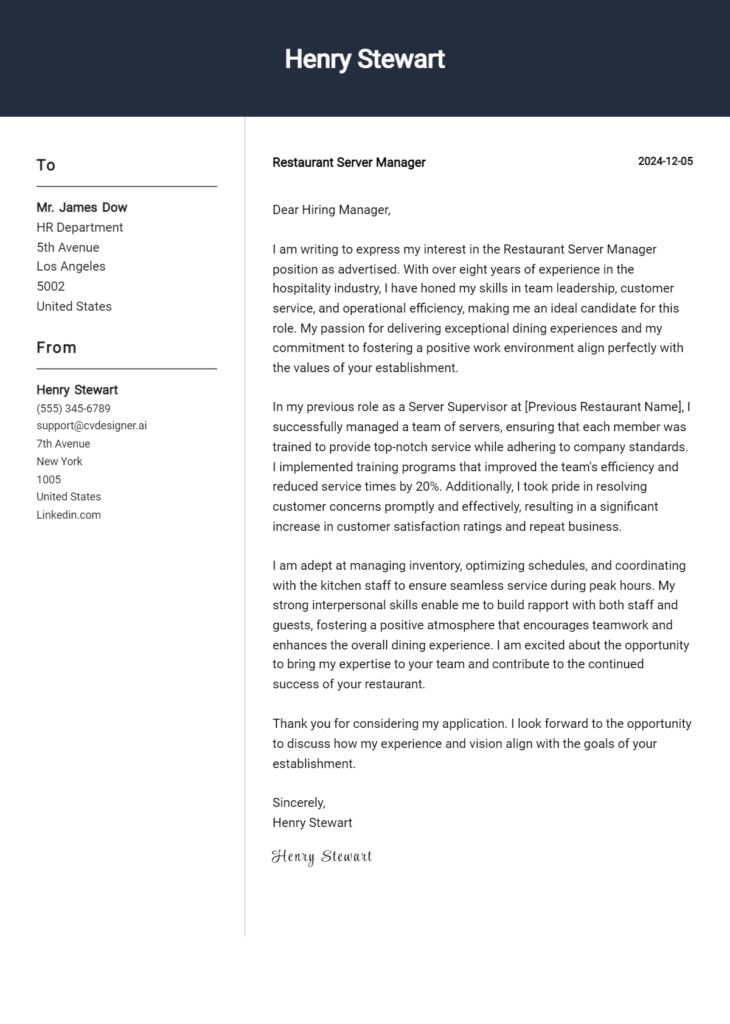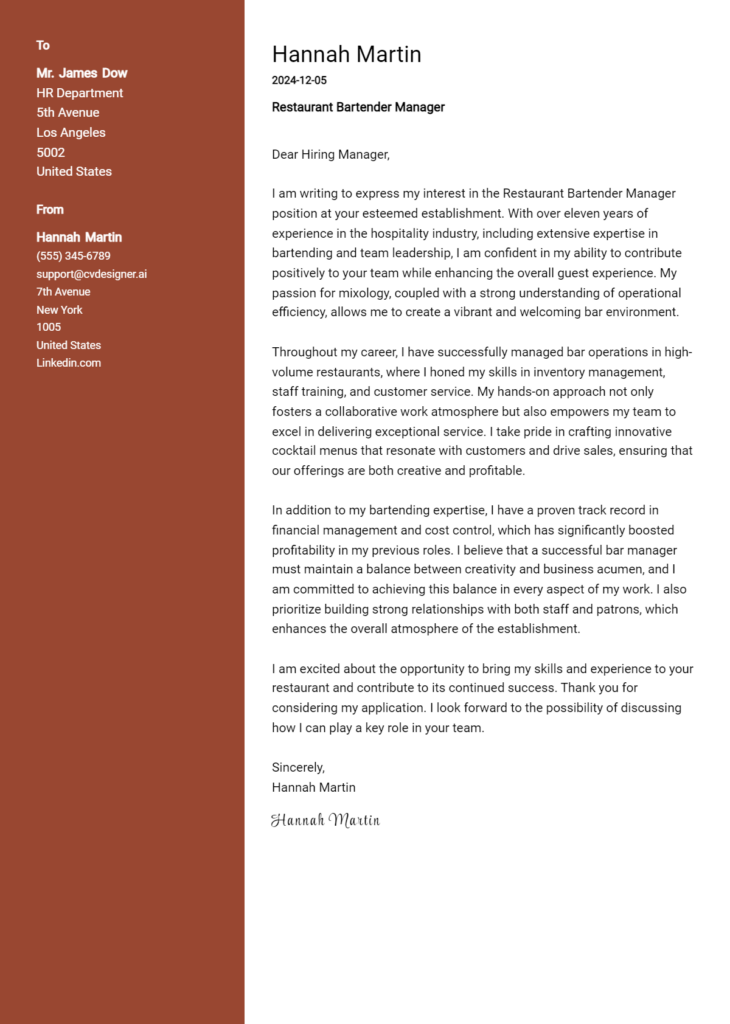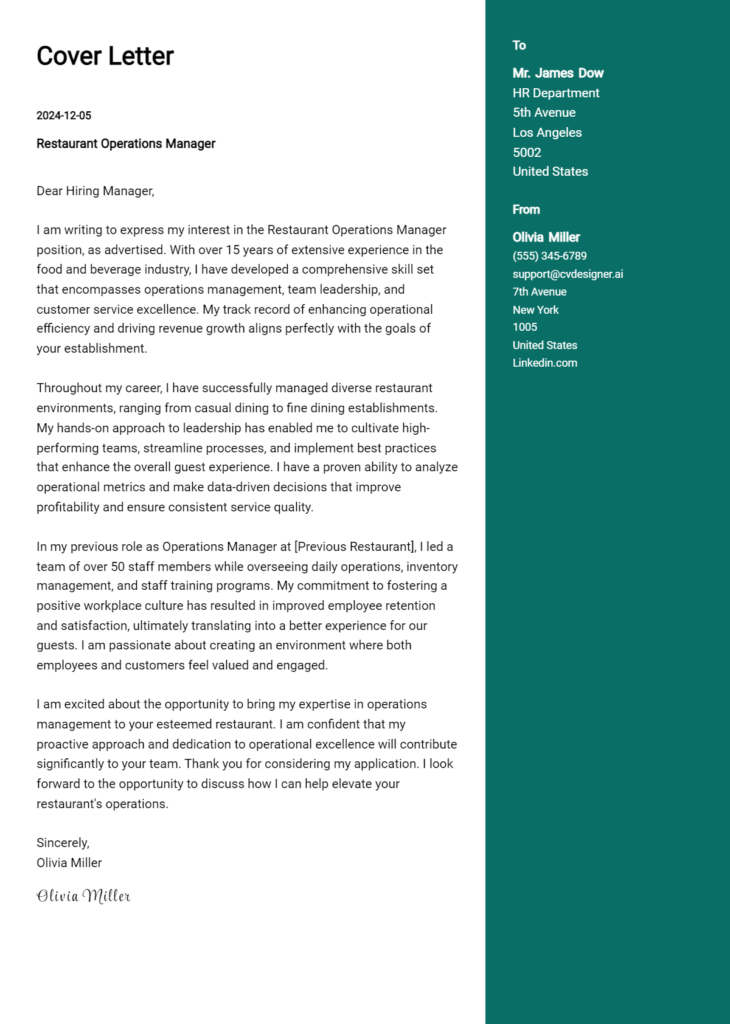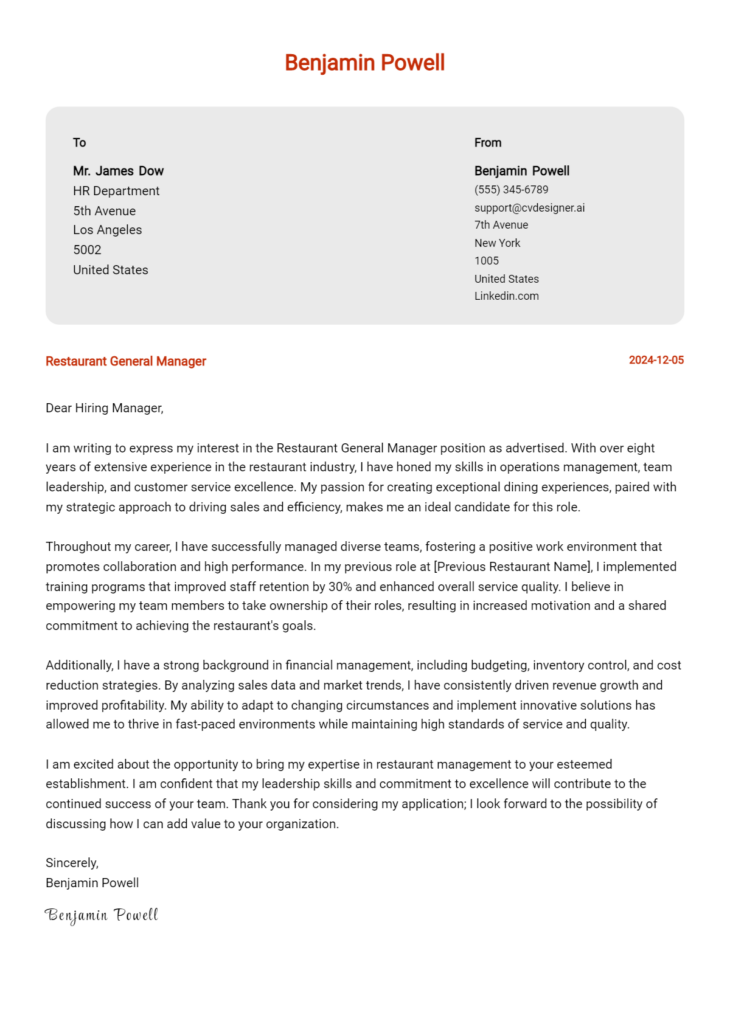Restaurant Kitchen Manager Cover Letter Examples
Explore additional Restaurant Kitchen Manager cover letter samples and guides and see what works for your level of experience or role.
How to Format a Restaurant Kitchen Manager Cover Letter?
Crafting a well-structured cover letter is essential for a Restaurant Kitchen Manager, as it serves as your first impression to potential employers. The presentation of your skills, experience, and culinary passion can set you apart in a competitive field. A meticulously formatted cover letter not only showcases your attention to detail and organizational skills but also reflects your ability to manage a kitchen effectively—key attributes in the restaurant industry.
In this guide, we’ll explore how to structure your cover letter, providing valuable insights and industry-specific examples to help you create a standout document.
We’ll examine the essential components of a professional cover letter, including:
- Cover Letter Header
- Cover Letter Greeting
- Cover Letter Introduction
- Cover Letter Body
- Cover Letter Closing
Each section plays a crucial role in emphasizing your qualifications and professionalism. Let’s delve into each part and discover how to make your cover letter shine in the culinary world.
Importance of the Cover Letter Header for a Restaurant Kitchen Manager
The cover letter header is a crucial component of your application as it sets the tone for the entire document. It provides essential information that not only identifies you but also indicates your professionalism and attention to detail. A well-structured header should include your contact information, the date, and the recipient's details. This clarity helps hiring managers quickly ascertain who you are and how to reach you, which is vital in a fast-paced industry like restaurant management.
A strong header reflects your organizational skills and respect for the hiring process, while a weak header can create confusion or give a negative impression right from the start.
Strong Example
John Doe 123 Culinary Lane Foodie City, CA 12345 (555) 123-4567 johndoe@email.com October 5, 2023 Hiring Manager Delicious Eats Restaurant 456 Flavor St Tasty Town, CA 67890
Weak Example
johndoe@email.com October 5, 2023 I want a job at Delicious Eats
The Importance of a Strong Cover Letter Greeting
The greeting of a cover letter is crucial as it sets the tone for the entire communication, reflecting your professionalism and approachability. A well-crafted greeting demonstrates your attention to detail and respect for the hiring manager, which is especially important in a competitive field like restaurant management. By addressing the recipient directly, you personalize the letter and establish a connection that can resonate with the reader. To avoid generic greetings, take the time to research the hiring manager’s name, which can often be found on the restaurant's website or through professional networking platforms. This effort shows your genuine interest in the position and the establishment.
Strong Greeting Example
Dear Chef Johnson,
Weak Greeting Example
To Whom It May Concern,
Cover Letter Introduction for Restaurant Kitchen Manager
A well-crafted cover letter introduction is crucial for a Restaurant Kitchen Manager position, as it sets the tone for the entire application and can significantly influence the hiring manager's decision. This opening paragraph should not only grab the reader's attention but also convey the candidate's enthusiasm for the role and briefly highlight relevant skills or accomplishments. A strong introduction will create a compelling case for why the candidate is the right fit for the job, while a weak introduction may fail to engage the reader or showcase the candidate's qualifications effectively.
Strong Example
Dear [Hiring Manager's Name], I am excited to apply for the Restaurant Kitchen Manager position at [Restaurant Name], as I believe that my 10 years of culinary experience and my passion for creating exceptional dining experiences align perfectly with your restaurant's commitment to quality and innovation. Throughout my career, I have successfully led diverse kitchen teams, implemented cost-saving initiatives that reduced food waste by 30%, and developed seasonal menus that increased customer satisfaction ratings by over 20%. I am eager to bring my expertise in kitchen management and my dedication to culinary excellence to your esteemed establishment.
Weak Example
Hello, I want to apply for the Kitchen Manager job. I have worked in restaurants for a while and have done some cooking. I think I might be a good fit. I have also managed a kitchen before but didn't really make any changes or improvements. I hope you will consider my application.
Purpose of the Cover Letter Body for a Restaurant Kitchen Manager
The cover letter body for a Restaurant Kitchen Manager serves as a critical platform for candidates to articulate their relevant skills, experiences, and the unique value they bring to the establishment. This section should highlight specific projects or accomplishments that demonstrate the candidate's leadership abilities, culinary expertise, and operational efficiency. By showcasing quantifiable achievements, such as reducing food costs by a certain percentage or successfully launching a new menu that increased customer satisfaction, the candidate can effectively convey their potential impact on the restaurant's success.
Strong Example
As the Kitchen Manager at Gourmet Bistro, I successfully led a team of 15 kitchen staff, implementing a new inventory management system that reduced food waste by 30% over six months. My hands-on approach to training staff in culinary techniques not only enhanced our food quality but also resulted in a 20% increase in positive customer reviews on platforms like Yelp and TripAdvisor. Furthermore, I spearheaded the launch of a seasonal menu that increased our monthly sales by 15% during the summer months, showcasing my ability to align culinary creativity with business goals.
Weak Example
I have worked in kitchens for many years and know how to cook well. I am a good manager and have experience with staff. I think I would be a great fit for your restaurant. I have also helped with menu changes before, which I believe is important.
Importance of the Cover Letter Closing for a Restaurant Kitchen Manager
The closing paragraph of a cover letter is crucial for leaving a lasting impression on the hiring manager. It serves to summarize your key qualifications, reiterate your enthusiasm for the role, and encourage the reader to take the next steps, such as reviewing your resume or scheduling an interview. A strong closing conveys confidence and eagerness, while a weak closing may leave the reader uncertain about your commitment or qualifications.
Strong Example
Thank you for considering my application for the Restaurant Kitchen Manager position at [Restaurant Name]. With over eight years of experience in fast-paced kitchen environments and a proven track record of enhancing team efficiency and food quality, I am excited about the opportunity to contribute to your esteemed establishment. I look forward to the possibility of discussing how my skills align with your needs and would be thrilled to further elaborate on my experience in an interview. Please feel free to review my resume for additional details. Thank you once again for your time and consideration.
Weak Example
I hope you can see that I would be a good fit for the Restaurant Kitchen Manager job. I have some experience and think I could help. If you’re interested, you can look at my resume. Thanks for reading this letter.
These tips will help candidates craft an effective cover letter for a Restaurant Kitchen Manager position, focusing on key aspects that hiring managers value. A well-rounded cover letter should illustrate not only your technical culinary skills but also your problem-solving abilities, knowledge of the service delivery lifecycle (SDLC), teamwork capabilities, and a passion for continuous learning. By emphasizing these traits, you can create a compelling narrative that showcases your fit for the role.
Tips for Crafting Your Cover Letter
Highlight Technical Skills: Detail your culinary expertise and specific skills relevant to the kitchen environment, such as food safety practices, menu planning, and equipment management. Use concrete examples from your past experiences to demonstrate your proficiency and how it has positively impacted previous establishments.
Showcase Problem-Solving Abilities: Describe instances where you successfully navigated challenges in the kitchen, such as managing supply shortages or resolving staff conflicts. This not only highlights your critical thinking skills but also your ability to maintain a calm and efficient kitchen under pressure.
Demonstrate SDLC Knowledge: If applicable, discuss your understanding of the service delivery lifecycle in the restaurant context. Detail how you have implemented processes that improve service efficiency and quality, and how you ensure that each stage meets the standards expected by customers.
Emphasize Teamwork: Acknowledge the importance of collaboration in a kitchen setting. Share examples of how you have fostered a positive team environment, trained staff, and worked alongside others to achieve common goals. This reflects your leadership style and ability to enhance team dynamics.
Express Passion for Continuous Learning: Convey your commitment to staying updated on culinary trends, new techniques, and industry standards. Mention any relevant courses, certifications, or workshops you have completed. This shows your dedication to professional growth and your proactive approach to improving your skills.
For additional help, consider using cover letter templates or a cover letter builder to create a polished and professional cover letter.
Common Mistakes to Avoid in a Restaurant Kitchen Manager Cover Letter
Crafting a compelling cover letter is essential for standing out in the competitive restaurant industry, especially for a pivotal role like a Kitchen Manager. Avoiding common mistakes can significantly enhance your chances of making a positive impression. Here are some frequent pitfalls and tips to steer clear of them:
Generic Content: Failing to customize your letter for the specific restaurant can make it seem impersonal. Always research the establishment and mention their values or recent achievements to show your genuine interest.
Neglecting Format: A poorly formatted cover letter can detract from your professionalism. Adhere to a structured cover letter format to ensure clarity and readability.
Overly Long Narratives: Cover letters should be concise and to the point. Aim for a length of about one page and focus on your most relevant experiences.
Lack of Specific Examples: Not providing specific examples of your achievements can weaken your case. Use quantifiable results to demonstrate your success in previous roles.
Ignoring the Job Description: Overlooking key responsibilities outlined in the job posting can lead to missing out on showcasing your relevant skills. Tailor your letter to align with the requirements mentioned.
Too Much Focus on Responsibilities: Instead of just listing past responsibilities, highlight how you excelled in those roles and contributed to your previous establishments.
Neglecting a Strong Closing: Failing to end with a strong call to action can leave your letter feeling incomplete. Conclude by expressing enthusiasm for the opportunity and a desire to discuss your application further.
By steering clear of these common mistakes, you can create a standout cover letter that significantly increases your chances of being invited for an interview. For inspiration, check out some cover letter examples that align with your industry.
Cover Letter FAQs for Restaurant Kitchen Manager
What should I include in my cover letter for a Restaurant Kitchen Manager position?
In your cover letter, it's crucial to highlight your relevant experience, culinary skills, and management abilities. Start by addressing the hiring manager and expressing your enthusiasm for the position. Include specific examples of your previous roles, such as menu development, kitchen staff training, and cost control measures you've implemented. Emphasize your leadership qualities and your ability to maintain high standards of food safety and sanitation. Additionally, mention any certifications you hold, such as ServSafe or culinary school credentials. Tailor your letter to reflect the restaurant’s mission and values, showing that you are not only a fit for the role but also a good cultural match for the establishment.
How do I showcase my leadership skills in the cover letter?
Showcasing your leadership skills in your cover letter involves providing concrete examples of how you've successfully managed kitchen teams in the past. Describe instances where you led a team through high-pressure situations, such as busy service hours or special events. Mention your approach to staff development, like conducting training sessions or implementing mentorship programs. Highlight your ability to foster a positive work environment, resolve conflicts, and motivate your team to achieve collective goals. Use metrics where possible, such as improved staff retention rates or increased kitchen efficiency, to demonstrate the impact of your leadership on the overall restaurant operations.
What tone should I use in my cover letter?
The tone of your cover letter should be professional yet approachable. You want to convey your passion for food and hospitality while maintaining a level of professionalism that reflects your experience. Use confident language to assert your qualifications, but avoid being overly formal or stiff. A conversational tone can help you connect with the reader, especially in the hospitality industry where personality matters. Be sure to express your enthusiasm for the role and the restaurant, making it clear that you appreciate the art of cooking and the importance of teamwork in a kitchen setting.
How long should my cover letter be?
Your cover letter should ideally be one page in length, typically around three to four paragraphs. This length allows you to succinctly present your qualifications without overwhelming the reader. Focus on providing enough detail to highlight your relevant experience and skills, but avoid unnecessary fluff. Be concise and direct, ensuring that every sentence adds value to your application. Aim for a balance between being informative and engaging; you want to capture the reader's attention while delivering the key points that demonstrate your suitability for the Restaurant Kitchen Manager position.
Build your Cover Letter in minutes
Use an AI-powered cover letter builder and have your letter done in 5 minutes. Just select your template and our software will guide you through the process.

